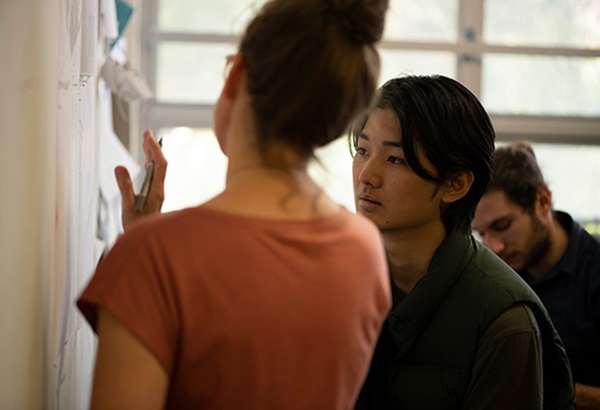Are you exploring your options for entry into medicine? Whether you’re a current year 12 student or a university undergrad, this is the ultimate guide for you.
Looking at your options for career opportunities in medicine should be simple. But we understand you might have a lot of questions.
What is an Assured Pathway? How much time does studying medicine really take?
Don’t stress! Many people like yourself are asking these questions too.
We’re going to break it down and tell you the answers to the most burning questions aspiring medical students like yourself are dying to know.
If you're a current year 12 student:
1. What is the Assured Pathway to medicine?
Assured Pathways are exclusive to school leaver applicants just like you (year 12 or equivalent). Your place is guaranteed based on your high school performance or similar (as long as you keep your grades up in the first two years of your bachelor’s degree).
The UWA Assured Pathway allows you to apply for your bachelor’s degree (Bachelor of Biomedicine (Specialised)) and postgraduate professional degree (Doctor of Medicine (MD), Doctor of Dental Medicine (DMD) or Doctor of Podiatric Medicine (DPM)) at the same time. You’ll graduate with two UWA degrees in six years (five years for DPM) of full-time study, ensuring a well-rounded education and the specialist skills needed in your chosen career.*
We also offer pathways to support and mentor students who are from diverse backgrounds, including the Indigenous entry pathway, rural entry pathway, and Broadway pathway.
If you still have questions, visit the course webpage for more information or contact the Future Students Centre through askUWA or call us on 131 UWA (131 892).
2. What subjects do I need to do at school to get into the Assured Pathway?
Lucky for you, there are no mandatory prerequisites for the Assured Pathway to medicine. But we do recommend some subjects. If you didn’t do ATAR maths or science, don’t stress. You’ll just need to take first-year maths and/or chemistry units alongside your major units.
3. How do I apply for an Assured Pathway to medicine?
Firstly, applicants must register for and sit the UCAT ANZ during the year of application (registrations close around May each year, test sittings take place during July and August).
You will then lodge a TISC application, which open at the start of May, and close in late September. UWA's Rural eligibility form must be submitted via TISC by the TISC closing date for Medicine if you are eligible. Refer to TISC Online for current course codes and application deadlines.
Notification regarding interview eligibility will be sent via email in November (after WACE exams are complete).
Interviews for all domestic school leavers are planned to take place during selected dates within November and December each year. Be aware that not all dates within this range will be available. Information regarding specific dates will be provided to shortlisted candidates. Candidates who cannot attend their interview within the offered date range cannot be guaranteed an alternative date.
Course offers will be as per TISC timelines.
4. How do I prepare for the UCAT?
The UCAT ANZ website has various preparation materials. We don’t endorse external UCAT preparation courses.
The UCAT makes up 20% of the final ranking on your application, your ATAR makes up 30% and interview is 50%.
5. Do I have to sit the UCAT in the year of my application?
You must sit the UCAT ANZ in the year you are applying (that is, the year prior to commencement). The UCAT ANZ score cannot be carried over from a previous application year.
6. If I have an Assured Pathway place, can I defer for 12 months?
Of course! This is known as deferring your offer. If you are offered an Assured Pathway place, you can accept and defer your offer for 12 months.
So, take some time off to relax and re-wind after all your hard work in year 12 and join us at UWA when you’re ready!
Be mindful in your decision to hit pause and defer as once you start your bachelor’s degree, you’re expected to study in full-time mode for the next six years.
.jpg)
.jpg?h=0&w=0&hash=C16AEC938E0B5ADA7980ED5B303F830C)
If you're a current university undergraduate student:
1. What is graduate entry to medicine?
If you didn’t quite meet the prerequisites for an Assured Pathway or have already delved into university life, there’s still a pathway for you!
You can study an undergraduate degree in any field of study, although there are some prerequisites for Optometry, Podiatric Medicine and Pharmacy. Then, apply for graduate entry into medicine (as long as you meet the admission requirements).
Admission requirements for graduate entry into the MD, DMD and DPM differ slightly.
For medicine (MD), you require an Australian bachelor’s degree (or overseas equivalent), with a minimum selection GPA of 5.5, a suitable GAMSAT score, fulfil Indigenous or rural quota requirements (if eligible) and an interview.
Still have questions? Visit the course webpage for more information.
2. How do I apply for graduate entry into medicine?
Domestic applicants can apply for graduate entry to the MD via GEMSAS, which open and close in accordance with the GEMSAS timeline. All domestic applicants must submit a valid GAMSAT score by the application closing date.
Applicants will be shortlisted for an interview based on their GAMSAT score and GPA. Shortlisted applicants are notified via email, usually one to two weeks prior to the interview date.
MD offers for domestic applicants will commence in November, in line with the GEMSAS timeline.
It is important to know that a graduate entry offer for the MD can’t be deferred.
3. How do I revise for the GAMSAT?
Studying a Bachelor of Biomedical Science at UWA positions you well for the GAMSAT exam.
For non-science graduates, some specific preparation covering relevant basic sciences to first year university level is recommended. Practice critical thinking, forming opinions and arguments.
The GAMSAT website has excellent resources to guide you in your preparation and are targeted towards the current GAMSAT exam. We don’t endorse any external GAMSAT courses.
Other frequently asked questions that apply to both year 12 and university undergraduate students:
1. How many offers are made each year?
Around 240 offers are made each year for the MD - 206 offers are made to domestic applicants, and 40 offers are made to international applications. From this, up to 50% of offers are made to Assured Pathway applicants.
Within these numbers, there are also quotas for Indigenous, rural and Broadway students.
2. What does a Bachelor of Biomedicine (Specialised) course involve?
The Bachelor of Biomedicine (Specialised) is a practical degree providing learning across a broad range of health and medical disciplines, designed to prepare you for UWA’s health professional degrees.
At UWA, this degree is taught by world-class researchers in cutting-edge laboratories and teaching spaces. You'll learn from and network with the state’s leading clinicians and biomedical scientists. You’ll also engage with your fellow students and expert teaching academics, making you a part of an exceptional cohort!
3. What else do medical students do (apart from lectures, workshops, tutorials, labs and so on)?
You'll get the opportunity to be immersed in hands-on training in hospital wards and clinics in Perth, general practices and community settings. You could also potentially train at the Rural Clinical School.
You can undertake scholarly activity in topics such as medical research, service learning and Aboriginal and public health.
In your third or fourth year of your MD, you can also sign up for overseas, urban or rural electives and selective units!
4. How much time does studying medicine really take?
The first 2 years of the Bachelor of Biomedicine (Specialised) (for Assured Pathway students) will have standard university semesters, each 12 weeks long. Depending on your unit choice, there will be approximately 12-15 contact hours per week for full-time study.
When you start your MD, there is approximately 20 hours per week of face-to-face contact time on campus, and at least 25 hours per week of personal study and online learning.
From your second year of the MD, you will be undergoing clinical placements, with additional after-hours and weekend requirements. The academic year runs for 42 weeks of the year.
5. How much support is available to medical students?
We are committed to the health and wellbeing of our students and want the best for you in your career and personal life.
UWA provides you with the best balance of flexible learning using online lectures with optional in-person attendance. Teaching activities require attendance, as the skills you will learn here have great value in your studies.
We also provide a variety of support services for our students. We have a dedicated Sub Dean for each year group, who can meet with you individually to talk about your circumstances and assist you in any personal and financial issues.
Every student is also connected to a clinical mentor via the UWA MD Professional Development Program. We’ll be there for you every step of the way. And we’re the only Medical School in Australia to have a program like this.
The Western Australian Medical Students’ Society also work collaboratively with academic staff to ensure student’s voices are heard, to improve your experience at UWA. They also make sure your social calendar is filled with events, networking, professional development and more!
Lastly, UWA recognise the challenges of studying and practicing medicine. You will be taught by teachers that have lived these challenges first hand, who will teach you the important skills you need to thrive in the medical industry.
6. How can I prepare for the interview?
You should focus on your ATAR and UCAT preparation (or achieving a high GPA and GAMSAT score for graduate entry applicants) as interviews are offered to those who score a certain ranking based on those assessments.
If you are shortlisted for an interview, you will be provided with preparation information for your interview.
We don’t endorse any external interview preparation courses. You got this!
7. What is the pathway to speciality training?
The MD prepares our students for training from initial internships to specialities.
Below is an example of a timeline of how long it may take to become a specialist doctor:
- Bachelor’s degree (3+ years)
- Doctor of Medicine (4 years)
- Junior hospital doctor (2 years)
- Specialist training (3-5+ years)
- Specialist Doctor (11-16 years)
8. What career opportunities can I get with a medical degree?
UWA health degrees open the door to a range of exciting career opportunities.* Completing the MD will help you become a Medical Practitioner in a range of specialisations. There is a medical speciality for every part of the body, every age and stage of human life. Your choice of specialisation depends on what appeals to you the most!
- If you are interested in human biology and physiology, then career opportunities in areas such as endocrinology, renal medicine and haematology may be of interest to you.
- If you are interested in the compassionate side of medicine, career opportunities in fields such as general practice, psychiatry and addiction may be for you.
- If you thrive on adrenaline but are calm in a crisis, career opportunities in areas such as surgery, critical care and anaesthesiology may be for you.
Plus many other professions, the list could go on! Other examples include working in the field of pharmacology, digital health, health technology and health informatics, health care for specific occupations (such as aviation and defence roles), travel medicine and so much more.
There are career opportunities for everyone in medicine. Explore careers opportunities in health.
9. What career opportunities can I get with a Bachelor of Biomedicine (Specialised) alone?
There are various career opportunities* you can explore after you complete the Bachelor of Biomedicine (Specialised) or the Bachelor of Biomedical Science, such as a Biomedical Scientist or Researcher, Infectious Disease Epidemiologist, Sports Scientist, Health Policy Adviser, Laboratory Technician or Manager and many others.
If you still have questions, give our Future Students team a call on 131 UWA (131 892), submit a question through askUWA , or book an appointment.
Apply now!
*further postgraduate studies may be required.







